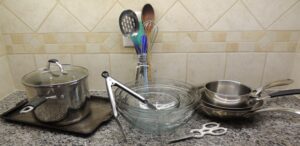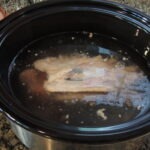“I’ve been a health nut for most of my life. My first memory of this was in the 1960’s when I was a kid and made the decision that I would no longer drink sodas. I thought they were too sweet and simply unhealthy. (In retrospect, I must have been a strange child!) After that decision I don’t recall ever being tempted to drink sodas again, except for the occasional ginger ale my mom would give me when I was sick.
My next foray into the health world was learning how to make my own natural beauty products (egg white face masks and almond meal face scrubs) when I was in middle school. Then came folk remedies when I was in high school. In college I followed other interests that led me to spend a year in France, travel extensively abroad, and finally end up in New York City, where I met my husband and started a family.
As a new mom concerned about giving my kids the very best, I found myself drawn back to natural remedies and healthful eating. I eventually earned a certificate as a Consulting Herbalist and an MS in Holistic Nutrition. I had unwittingly circled back to my earlier interests.
So, it’s no surprise that my kids grew up eating a wholesome diet, and that our project, the FINITE FOODIE, focuses on healthful recipes. As Rebecca, Greg and I discussed the types of recipes to develop for this project, we all agreed that in addition to being as healthful as possible, the recipes should also consider the limitations of having little money, little time and little interest in nutrition (or cooking).
In short, we needed BALANCE. Following the latest fad or even the latest science can be dizzying and often impractical. A healthy lifestyle needs to be sustainable in the real world.
In our effort to remain practical, we’ve taken many of our favorite recipes and tweaked them just enough to make them a little more nutritious, but still delicious, easy and affordable. Our recipes are fairly mainstream, some with a contemporary flair. Whenever possible, we include tips for making healthy choices and for demystifying cooking techniques and terminology.
Preparing your own food at home is the first and best way to improve your diet, avoid processed foods, and save money. We recommend using whole grains, local foods when possible, and a colorful variety of fruits and vegetables.
Wholesome, natural foods provide thousands of nutrients in complicated combinations that are not yet fully understood. However, we do know that a diet consisting primarily of processed food (like chips, sodas, cookies, etc.) will not provide the full spectrum of health benefits that can be obtained from whole food. Supplements may fill in nutritional gaps, but they should only be used to supplement an already balanced diet. They do not work as a substitute!
Eating a nutritionally sound diet is quite simple when you follow these basic concepts:
- Eat food in a form that is as close to nature as possible.
- Prepare your own meals as often as possible to have control over the ingredients.
- Eat when you’re hungry, but not too much at one time.
- Eat a wide variety of fruits and vegetables, filling your plate with more vegetables than anything else.
- Know your body, and avoid foods that cause uncomfortable reactions. (Examples of common allergens are gluten, dairy, soy, corn, eggs, fructose and peanuts, but can be just about anything.)
- Limit sugars, including artificial sweeteners.
- Drink plenty of water (about 8 cups) every day.
Are you ready to get started now with a new approach to food? We’re ready to show you the way.”
~ Bobbi

